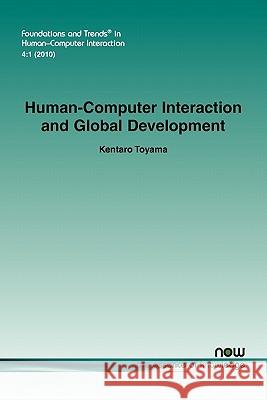Human-Computer Interaction and Global Development » książka
Human-Computer Interaction and Global Development
ISBN-13: 9781601983909 / Angielski / Miękka / 2010 / 94 str.
In the same world where there are over 1.4 billion Internet users, another 1.4 billion people live below the extreme poverty line as defined by the World Bank. A field called "information and communication technologies for development" (ICT4D) has sought to find ways to apply modern electronic technologies - the Internet, the PC, the mobile phone, and other technologies - to support the socio-economic growth of the world's poorest communities. Are there patterns of technology usage that are consistent across developing countries? Can you keep five rural schoolchildren from fighting over one PC? How do you design mobile-phone interfaces for an illiterate migrant worker? Of course, these are exactly the sorts of questions that researchers in human computer interaction would also ask, and HCI has increasingly engaged with international development. Human-Computer Interaction and Global Development overviews the historical interaction between HCI and ICT4D, compares their disciplinary approaches, and suggests that both sides would gain from ongoing interaction. International development could benefit from HCI's broad methodological tools, which include qualitative and quantitative research methods, design through iterative prototyping, and reflective inquiry. HCI could benefit from international development's exposure to a broader base of cultures, sectors, and concerns. These issues are discussed with specific examples from published papers and several well-known projects that apply HCI to development. Finally, future directions for an ongoing collaboration between HCI and development are also indicated. Human-Computer Interaction and Global Development is meant for HCI experts interested in how their field could contribute to the challenges of global poverty, as well as for members of the international development community who would like to understand the potential for ICT in their work.











